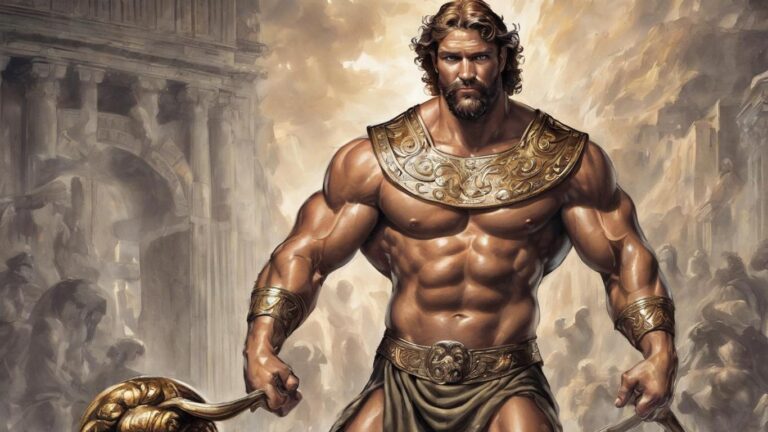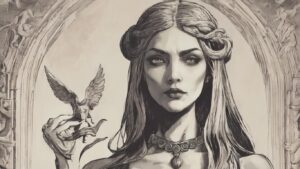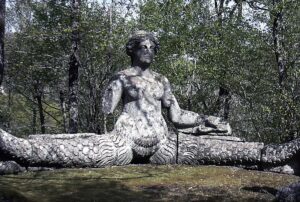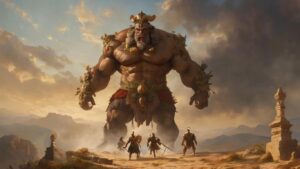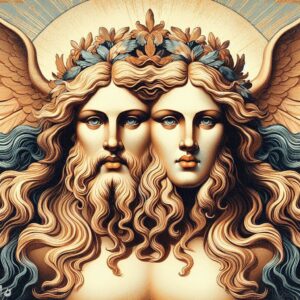Table of Contents
Hercules, the legendary hero of Greek mythology, is renowned for his incredible strength and the completion of the Twelve Labors.
Origins
Hercules, was born through an unconventional union between Zeus, the king of the gods, and Alcmena, a mortal woman. Zeus, captivated by Alcmena’s beauty, devised a plan to be with her. Disguising himself as Alcmena’s husband, Amphitryon, Zeus spent a night with her while the real Amphitryon was away.
As a result of this divine union, Hercules was conceived. His birth, however, involved an intricate twist orchestrated by Zeus to deceive Hera, his wife and Hercules’ future stepmother. Hera, known for her vengeful nature, sought to harm Hercules due to his divine parentage. To protect Hercules, Zeus employed cunning tactics.
To further complicate matters, Zeus also arranged for the birth of another child, Eurystheus, who would later play a significant role in Hercules’ life. This intricate web of divine manipulation set the stage for Hercules’ extraordinary and often challenging journey, filled with feats of strength, heroism, and divine trials.
Hercules, as a result of a series of tragic events and divine interventions, was tasked with the Twelve Labors as a form of punishment. The story goes as follows:
Madness and the Murder of Family:

Hercules, under the influence of a fit of madness sent by the goddess Hera, unknowingly killed his wife Megara and their children. When he regained his sanity and realized the magnitude of his actions, he sought purification and guidance.
Consultation with the Oracle at Delphi:
Seeking atonement for his crimes, Hercules consulted the Oracle at Delphi. The oracle, speaking on behalf of the gods, informed Hercules that he needed to serve King Eurystheus and complete ten labors to cleanse himself of his sins.
Servitude to King Eurystheus:
Hercules, accepting his fate, became a servant to King Eurystheus, a distant relative and a rival, who would assign him the Twelve Labors.
Assignment of the Twelve Labors:
King Eurystheus, under the influence of Hera’s resentment toward Hercules, assigned him a series of seemingly impossible tasks known as the Twelve Labors. The tasks were designed to be both dangerous and humiliating.
Completion of the Twelve Labors:
Hercules embarked on a journey to complete the assigned labors, facing various mythical creatures and challenges. The tasks included slaying the Nemean Lion, capturing the Golden Hind, cleaning the Augean stables, and capturing the Cretan Bull, among others.
Atonement and Redemption:
The completion of the Twelve Labors served as a form of atonement for Hercules’ earlier actions. Despite the incredible difficulty of the tasks, Hercules demonstrated unparalleled strength, courage, and resourcefulness.
While the Twelve Labors were initially a form of punishment, Hercules’ successful completion of these tasks elevated him to the status of a legendary hero.
Twelve Labors
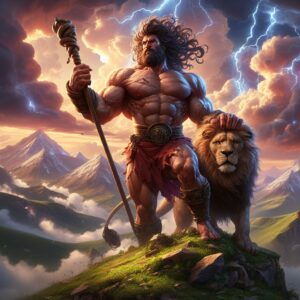
- Slay the Nemean Lion. Hercules had to kill the Nemean Lion, a powerful and invulnerable beast. He strangled the lion with his bare hands.
- Capture the Hind of Ceryneia. Hercules was tasked with capturing the Golden Hind, a deer with golden antlers sacred to Artemis. He succeeded by being patient and outsmarting the Hind.
- Slay the Erymanthian Boar. Hercules had to capture the fierce Erymanthian Boar alive. He chased the boar into deep snow, eventually capturing it.
- Capture the Ceryneian Hind. Hercules was tasked with capturing another Hind, this time from Ceryneia. He chased it for a year before finally capturing it.
- Clean the Augean Stables. Hercules had to clean the vast and filthy Augean stables in a single day. He diverted two rivers to wash away the filth.
- Slay the Stymphalian Birds. Hercules was tasked with defeating the Stymphalian Birds, aggressive creatures with sharp metallic feathers. He used a rattle given by Athena to scare and kill them.
- Capture the Cretan Bull. Hercules had to capture a raging bull from Crete. He succeeded in subduing and bringing it to King Eurystheus.
- Steal the Mares of Diomedes. Hercules had to steal the man-eating Mares of Diomedes. During the struggle, he fed Diomedes to his own horses and then brought the mares to King Eurystheus.
- Obtain the Girdle of Hippolyta. Hercules was tasked with obtaining the girdle (belt) of the Amazon queen, Hippolyta. He succeeded after some initial conflict.
- Obtain the Cattle of the Monster Geryon. Hercules had to fetch the cattle of the three-headed monster Geryon. After defeating Geryon, he returned the cattle to King Eurystheus.
- Steal the Apples of the Hesperides. Hercules was tasked with obtaining the golden apples from the Hesperides. With the help of Atlas, he succeeded in retrieving the apples.
- Capture and Bring Back Cerberus. Hercules’ final labor was to capture Cerberus, the three-headed dog guarding the entrance to the Underworld. With the permission of Hades, he successfully brought Cerberus to the surface.
Life after Twelve Labors
After Hercules completed the Twelve Labors, various myths describe his life and adventures post-labors. Here are some key events that occurred in Hercules’ life afterward.
Service to King Omphale:
Transitioning from his heroic trials, Hercules faced servitude to Queen Omphale of Lydia. Punished for a past murder, he executed various tasks and labors to appease the queen.
Marriage to Deianira:
Later, Hercules wed Deianira, daughter of King Oeneus. Yet, challenges arose, notably the encounter with the deceitful centaur Nessus, a factor in Hercules’ eventual demise.
The Death of Nessus and the Poisoned Robe:
Having killed Nessus, Hercules was unaware of the centaur’s trickery. Nessus convinced Deianira that his blood-soaked robe was a love charm. Deianira, deceived, sent the poisoned garment to Hercules.
Hercules’ Tragic Death:
Wearing the poisoned robe, Hercules endured excruciating pain. Consequently, realizing the consequences, he constructed a funeral pyre. Subsequently, Hercules ascended, and in some versions, Zeus intervened, granting him immortality on Mount Olympus.
In recognition of his great deeds, some myths depict Hercules being granted immortality and marrying Hebe, the goddess of youth and cupbearer of the gods. Consequently, this union allowed Hercules to dwell on Mount Olympus as a full-fledged god.
Descendants and Legacy:
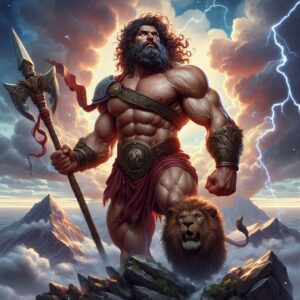
Hercules’ legacy persisted through his descendants, notably his son Hyllus. Continuing the hero’s lineage, Hyllus played a significant role in upholding Hercules’ accomplishments. The tales of Hercules’ exploits endured in Greek mythology, immortalizing him as a symbol of strength and heroism.
Attributes and Iconic Symbols
Hercules, renowned for immense strength, wielded the Nemean Lion’s skin—a symbol of invincibility. Additionally, his weapons, the club and bow, signified power and heroic defiance.
Transitioning to his third labor, Hercules utilized the Golden Hind’s antlers, symbolizing adaptability. Moreover, in his fifth labor, the Augean stables showcased his resourcefulness, using rivers for cleansing.
The apples of the Hesperides, obtained in his eleventh labor, became a symbol of perseverance. Moreover, Hercules’ determination to complete tasks was unwavering. Transitioning to his twelfth labor, the capture of Cerberus, showcased mastery over strength and strategy.
His symbolic journey extended to the Erymanthian Boar, a testament to his valor. In his seventh labor, facing the Cretan Bull highlighted his ability to confront diverse challenges. Altogether, Hercules’ attributes and symbols embodied his essence—strength, resilience, and triumph over adversity.
Family and Friends
Hercules, in Greek mythology, had a complex family and relationships. Here are some key members of Hercules’ family and notable individuals in his life:
Parents:
- Zeus: Hercules was the son of Zeus, the king of the gods. His divine parentage granted him extraordinary strength and abilities.
- Alcmena: Alcmena, a mortal woman, was Hercules’ mother. She was married to Amphitryon but had a night with Zeus, resulting in Hercules’ birth.
Siblings:
- Iphicles: Iphicles was Hercules’ mortal half-brother, the son of Alcmena and Amphitryon. He did not share Hercules’ divine strength.
Spouse:
- Megara: Hercules married Megara, the daughter of Creon, king of Thebes. Tragically, due to Hera’s influence, Hercules killed Megara and their children in a fit of madness.
Children:
Hercules had several children, and their names may vary in different versions of the myths. Notable children include:
- Hyllus: Hyllus was one of Hercules’ sons, and he played a significant role in continuing the hero’s legacy.
- Telephus: In some versions, Telephus is considered Hercules’ son, born from a union with the princess Auge.
Friends and Allies:
- Iolaus: Iolaus was a close companion and nephew of Hercules. He often accompanied Hercules on his journeys and adventures.
- Atlas: In one of Hercules’ labors, he sought the help of Atlas to retrieve the golden apples. Atlas held up the heavens and briefly took Hercules’ place during the task.
Teacher and Mentor. Chiron: Chiron, the wise centaur, served as a mentor to Hercules during his youth. Chiron provided guidance and education to the young hero.
FAQ
Who are Hercules' parents?
Hercules is the son of Zeus, the king of the gods, and Alcmena, a mortal woman. His divine parentage grants him extraordinary strength.
What are the Twelve Labors of Hercules?
The Twelve Labors are a series of tasks assigned to Hercules by King Eurystheus as punishment for his acts of madness. They include tasks like slaying the Nemean Lion, capturing the Golden Hind, and cleaning the Augean stables.
Did Hercules have siblings?
Hercules had a mortal half-brother named Iphicles, born to Alcmena and her husband Amphitryon.
Who were Hercules' spouse and children?
Hercules married Megara, and together they had children. However, due to Hera's influence, Hercules tragically killed Megara and their offspring in a fit of madness. He also had other children from different relationships.
What is the story of Hercules and Megara?
Hercules and Megara's story involves their marriage and the tragic events that unfolded, including Hercules unintentionally causing their deaths under the influence of Hera's madness.
Who were Hercules' friends and allies?
Iolaus, Hercules' nephew, was a close companion who often accompanied him on his adventures. Chiron, the wise centaur, also served as a mentor to Hercules during his youth.
What was Hercules' relationship with the gods?
Hercules was the son of Zeus, which made him a demigod. His relationship with the gods, particularly Hera, was complex due to Hera's jealousy and resentment toward him.
How did Hercules die?
In Greek mythology, Hercules died by consuming poisoned wine. This tragic event was orchestrated by his wife Deianira, who unknowingly used the poisoned blood of the centaur Nessus in an attempt to win back Hercules' love.
